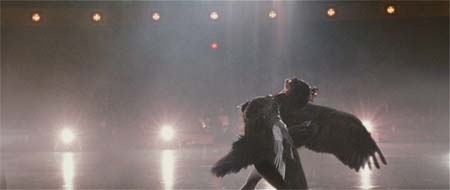DIRECTED BY: Zach Helm
FEATURING: Dustin Hoffman, Natalie Portman, Jason Bateman, Zach Mills
PLOT: Mr. Magorium, who has run his magical toy store for nearly three centuries, prepares for his imminent departure from the earthly realm, but his plans to hand the reins over to store clerk and aspiring composer Mahoney are endangered by her ambivalence, the suggestions of a straight-laced accountant, and the protests of the store itself.

COMMENTS: From Dictionary.com:
whim·sy [ˈ(h)wim-zee] n. 1: capricious humor or disposition; extravagant, fanciful, or excessively playful expression: “a play with lots of whimsy.” 2: an odd or fanciful notion. 3: anything odd or fanciful; a product of playful or capricious fancy: “a whimsy from an otherwise thoughtful writer.”
Zach Helm has an undisguised interest in finding joy amidst the frustrations of life. His screenplay for Stranger Than Fiction focused on a person who has spent his whole life in the grey and comes late to discovering the beauty of leading a more colorful existence. Here, making his directorial debut, he presents a world drenched in color and offers us a character who revels in it, until she doesn’t, and has to find her way back. The former film looked wistfully at the joyful world that was lost. This time around, we need to be right in the heart of that joy, and Helm’s weapon of choice is whimsy. Truckloads of it.
Our setting, identified in the title, is a sort of mad mashup of Willy Wonka’s chocolate factory and Weasley’s Wizard Wheezes. It’s a hyperactive place, perpetually bustling with children who have somehow pried themselves away from their PlayStations so that they can indulge in the unexpected surprises of the toyshop. The toys come to life. Any plaything you desire can be found in a great big book. Bouncy balls are always on the lookout for an escape opportunity. There is always something going on, so much so that the movie is its own Easter egg generator. It’s the kind of a place where dinosaur skeletons peek out the window, Playmobil figures do actual construction, and Kermit the Frog does his weekly shopping. (That’s Kermit himself, looking strangely embarrassed to be stared at, or maybe just to be in the movie.) It’s fun, and then it’s fun, and ultimately it’s FUN, DAMMIT.
All this is overseen by an enormously affected Hoffman. With eyebrows to rival Thufir Hawat and an Ed Wynn-style lisp that would be mincing under any other circumstances, he’s carefully constructed to be eccentric. Sometimes that’s refreshing, best exemplified by his equanimous attitude toward the impending end of his life. He’s not at all cynical, but eager to indulge in pleasures large and small right to the very end. On the other hand, he’s liberally draped with quirks: wearing loud patterns, bantering with his zebra roommate, and obsessed with hot dog buns. This can have mixed results: I groaned Continue reading IT CAME FROM THE READER-SUGGESTED QUEUE: MR. MAGORIUM’S WONDER EMPORIUM (2007)






